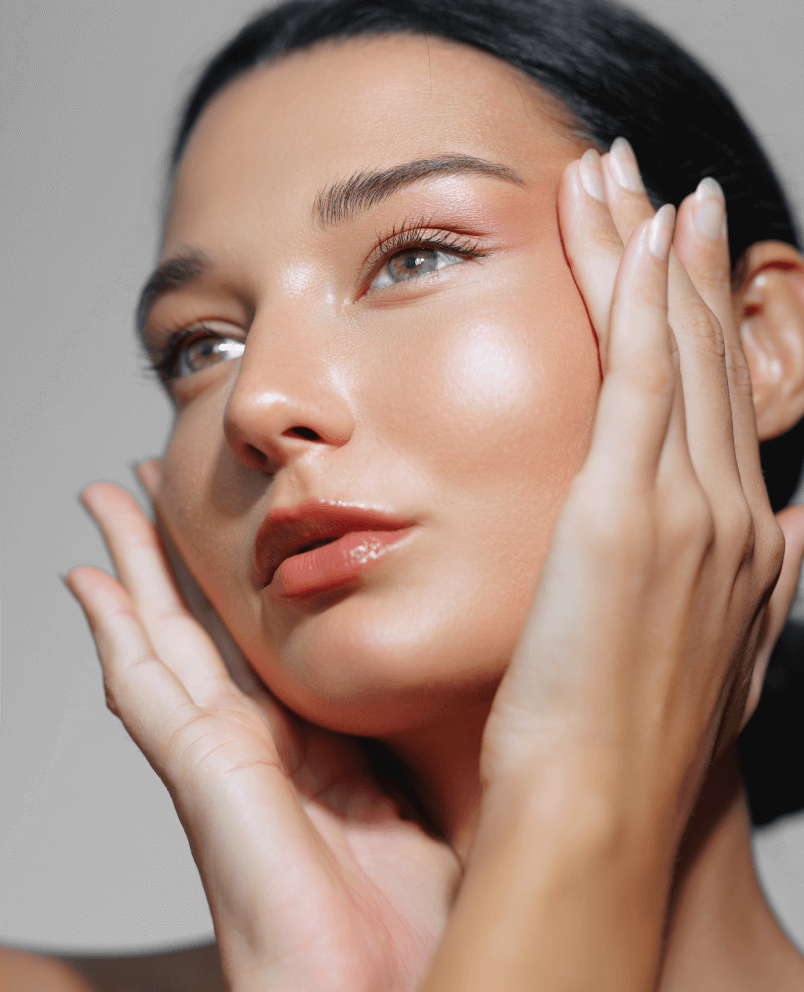
Skin Brightening Treatment in Singapore
About Lackluster Skin: Understanding the Causes
and the Importance of Brightening

Our skin is often a reflection of our overall well-being, but when it lacks brightness, it can appear tired and dull. Several factors contribute to a lack of skin radiance, from environmental stressors to lifestyle choices. Understanding these causes and the importance of brightening treatments is essential for restoring a healthy, vibrant complexion.

Shine Brighter and Glow Stronger with Skin Brightening Treatment
If dullness, dark spots, or uneven skin tone are holding you back, skin-lightening treatments can work wonders for your skin. Here’s why they are worth considering:
- Bye-Bye Dark Spots: Whether it’s sun damage, acne scars, or dark pigments due to hyperpigmentation, brightening treatments can help fade those pesky marks and leave your skin even and flawless.
- Instant Glow Boost: Have dull, tired skin? Not anymore! Skin brightening treatments reduce pigmentation, reduce dark spots, and improve overall skin tone to make your skin look fresh and luminous.
- Smoother Softer Skin: Many skin brightening treatment plans also promote collagen production, which means you get improved skin texture and brighter skin that feels baby-soft.
- Sun Damage Repair: Years of sun exposure can leave behind dark patches. However, skin-brightening ingredients like Vitamin C and treatments like chemical peel can help reverse the damage.
- Slow Signs of Aging: Fine lines and wrinkles appear more noticeable on dull skin, but with treatments involving intense pulsed light or laser treatments, you can get a more youthful and radiant complexion.
- Hydration and Nourishment: Along with controlling melanin production, skin brightening treatments also come packed with hydrating ingredients that keep your skin plump and healthy.
Dullness
The Cause
Dullness occurs when the skin lacks the natural glow that comes from healthy, well-hydrated skin. This can be caused by dead skin cell buildup, dehydration, poor circulation, or exposure to pollutants and UV rays, all of which prevent the skin from reflecting light evenly.
Importance of Treatment
Treating dark spots is essential for maintaining a clear and youthful complexion. Topical treatments containing ingredients like hydroquinone, vitamin C, and kojic acid can help fade dark spots, while sunscreen is critical in preventing new spots from forming.
Uneven Skin Tone
The Cause
Uneven skin tone results from an irregular distribution of melanin, often due to sun exposure, hormonal changes, or post-inflammatory hyperpigmentation from acne or other skin injuries. This can lead to patches of darker or lighter skin, disrupting the uniformity of your complexion.
Importance of Treatment
Addressing uneven skin tone is crucial for achieving a smooth, consistent complexion. Using products with niacinamide, retinoids, or chemical exfoliants can help even out skin tone over time, while professional treatments like chemical peels or laser therapy can provide more immediate results.
Dark Spots
The Cause
Dark spots, also known as age spots or sun spots, are caused by an overproduction of melanin in certain areas of the skin. These spots often result from prolonged sun exposure, aging, or hormonal changes, and can appear anywhere on the body but are most common on the face, hands, and shoulders.
Importance of Treatment
Treating flakiness is crucial for maintaining smooth and healthy skin. Regular exfoliation with gentle scrubs or enzymes can help remove dead skin cells, while hydrating serums and creams can restore moisture balance, reducing flakiness and improving the skin’s texture.
Hyperpigmentation
The Cause
Hyperpigmentation refers to areas of the skin that become darker than the surrounding skin due to an excess of melanin. This can be triggered by sun damage, inflammation, hormonal changes, or certain medications, leading to uneven patches that can be difficult to lighten without proper care.
Importance of Treatment
Addressing hyperpigmentation is important for restoring an even and radiant complexion. Consistent use of brightening products, combined with sun protection and professional treatments like microdermabrasion or laser therapy, can significantly reduce hyperpigmentation and prevent further discoloration.
Environmental Factors
The Cause
Environmental factors such as pollution, UV exposure, and harsh weather conditions can take a toll on the skin, leading to oxidative stress that causes dullness, dark spots, and an overall lack of vibrancy. These external stressors can damage the skin barrier and accelerate the aging process.
Importance of Treatment
Protecting the skin from environmental factors is essential for maintaining its brightness and health. Incorporating antioxidants like vitamin C and E into your skincare routine, along with daily sunscreen use, can help neutralize free radicals and shield the skin from environmental damage.
Age
The Cause
As we age, our skin’s natural cell turnover slows down, leading to a buildup of dead skin cells that can make the skin appear dull and uneven. Additionally, the cumulative effects of sun exposure over the years can cause dark spots and hyperpigmentation to become more prominent.
Importance of Treatment
Treating age-related dullness and pigmentation issues is vital for preserving a youthful, glowing complexion. Using anti-aging products that promote cell turnover, such as retinoids and AHAs, along with regular professional treatments like chemical peels or facials, can help rejuvenate the skin and maintain its brightness.
Stress
The Cause
Stress can have a profound impact on the skin, leading to a lack of radiance and the development of issues like dullness, dark circles, and uneven skin tone. Stress hormones can trigger inflammation, reduce skin’s ability to heal, and lead to poor lifestyle choices that further affect skin health.
Importance of Treatment
Managing stress is essential for maintaining a bright and healthy complexion. In addition to adopting stress-reducing practices like mindfulness or exercise, using soothing and hydrating skincare products can help counteract the effects of stress on the skin, restoring its natural glow.
Improper Skincare Habits
The Cause
Improper skincare habits, such as inadequate cleansing, over-exfoliation, or skipping sunscreen, can lead to a lack of skin brightness. These habits can disrupt the skin’s natural balance, cause irritation, and increase the likelihood of pigmentation issues.
Importance of Treatment
Establishing proper skincare habits is crucial for maintaining a radiant complexion. A consistent routine that includes gentle cleansing, regular exfoliation, hydration, and sun protection can help keep the skin bright and healthy, preventing issues like dullness and hyperpigmentation from taking hold.
How to Maintain Skin Brightness After a Treatment
So, you just had an amazing facial or skin brightening treatment and your skin is glowing, smooth, and radiant. However, the real challenge now is that you have to keep that brightness for as long as possible. The good news is, that it’s totally doable with the right post-treatment care. Here’s how you can keep that glow going strong after you go under a skin whitening treatment.
1. Hydration is Your Best Friend
Whether it is chemical peel, facial, or microneedling, a lot of skin treatments need follow-up hydration because the more hydrated your skin is, the longer your brightness lasts. To maintain the glow after a skin-brightening treatment:
- Drink plenty of water
- Use a hydrating serum with hyaluronic acid
- Apply a rich moisturiser to lock in moisture.
Glowing skin starts from within, so don’t forget to nourish your body too!
2. Sunscreen is Non-Negotiable
If there’s one thing that can steal your glow fast, it’s UV damage. After treatment, your skin is more sensitive, so never skip SPF for sun protection, even if it’s cloudy:
- Choose a broad-spectrum SPF 30+
- Reapply every 2-3 hours if you are outside
- Wear a hat or sunglasses for extra protection
Trust us, you will thank us for this!
3. Use Gentle, Glow-Boosting Products
Your skin is extra delicate after treatment, so avoid harsh scrubs or strong actives (like retinol) for at least a few days. Instead, go for:
- Vitamin C serum: boosts radiance & fights dullness
- Niacinamide: soothes, brightens, and evens skin tone
- Aloe or Centella: calms redness & supports healing
4 Skip the Heavy Makeup (For Now!)
Your skin needs time to breathe after a facial, no matter what your skin type is. If you can, go makeup-free for at least 24 hours to let your skin soak up all the post-treatment goodness. When you do wear makeup again, choose lightweight, non-comedogenic formulas to avoid clogging pores.
| Factor | How it Helps Skin Brightness | Best Ingredients/ Treatments |
| Dark Spot Reduction | Fades hyperpigmentation and evens skin tone | Vitamin C, chemical peel, IPL |
| Collagen Boost | Improves skin texture and elasticity | Laser Treatments, Microneedling |
| Sun Damage Repair | Reverse effects of prolonged sun exposure | Antioxidants, SPF, Skin peels |
| Hydration and Nourishment | Keeps skin plump, smooth and glowing | Hyaluronic acid, niacinamine |
| Post-Treatment Care | Maintains brightness and prevents dullness | SPF, Gentle skincare hydration |
How to Maintain Skin Brightness After a Treatment

The Importance of Brightening for Radiant Skin
Bright, glowing skin is a sign of health and vitality. By understanding the causes of a lack of brightness and taking steps to address these issues, you can achieve a luminous complexion that reflects your inner well-being. Investing in high-quality brightening products and treatments, combined with a consistent skincare routine and protection from environmental factors, is key to keeping your skin radiant and youthful. Remember, brightness isn’t just about appearance—it’s about nurturing your skin so that it remains healthy, vibrant, and full of life.
Recommended Facial Treatments: KB Whitening Treatment, Aperio 24K Dorado Treatment, Oxygeneo Treatment


